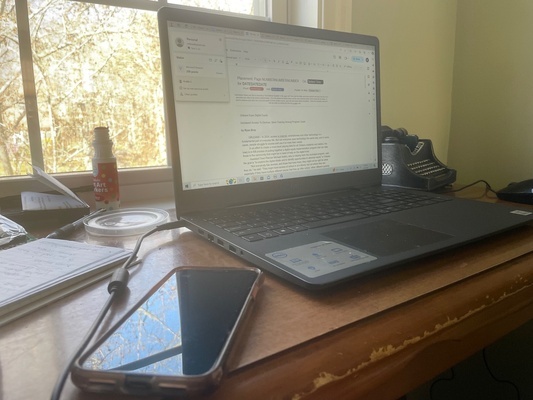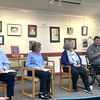Orleans Eyes Digital Equity
 The town of Orleans is working to prepare a digital equity program to improve local access to devices and better educate and train people on how to use them. RYAN BRAY PHOTO
The town of Orleans is working to prepare a digital equity program to improve local access to devices and better educate and train people on how to use them. RYAN BRAY PHOTO
ORLEANS – In 2024, access to the internet, smartphones and other technology is a fundamental part of everyday life. But not everyone uses technology the same way, and in some cases people struggle to access and use it to meet their needs.
In an effort to create a more level playing field for all Orleans residents and visitors, the town is in the process of putting together a digital equity implementation program that can help those in the community who might be in need of help on the digital front.
Assistant Town Planner Michael Solitro, who is helping helm the municipal program, said the goal is “to explore the digital divide and to identify opportunities to advance equity” in Orleans.
“Not everybody has devices, and those that have them, they might not be right for what they do,” he said. “They might have access at school or at a library, but not where they are, especially if they have multiple different places that they go after school, either different parents or someone who’s watching them.”
Orleans is the third community on the Cape behind Bourne and Sandwich to take advantage of a planning grant through the Massachusetts Broadband Institute and MassTech Collaborative to put together a local implementation program. The grant makes up to $100,000 available to towns statewide that apply, and Solitro said Orleans received approximately $60,000 to work with a consultant to help identify local goals.
The town solicited resident input about their technological needs through an online survey earlier this year. On April 9, a public workshop was held at the Orleans Senior Center to further gather public input, which Solitro said will be used to further craft the implementation plan.
The Cape Cod Commission is assisting the town in developing its local program, which Solitro said will specifically address issues of internet reliability in Orleans, the availability of adequate devices and digital literacy.
Solitro questioned data and presentations he’s seen in the past that show Barnstable County to be largely without service issues.
“We know that’s not the case all the time, especially in the summer with the stress on the infrastructure just based on the number of people,” he said.
Access to adequate devices will also be addressed, Solitro said, adding that he’s heard anecdotally about people sharing medical information and other sensitive materials through out-of-date phones and technology. But access alone is not enough, he said. There should also be support in place so people know how to use the available technology and devices.
“We want to make sure there is a support system of how to use it, when to use it and then what if something happens,” he said. “So it’s not just ‘Here, here’s a free device.’ It’s ‘Here’s access to a free device, and here are resources if something comes up.’”
The need for more digital services and programs was a recommendation that came from attendees of the April 9 workshop, Solitro said. He said that when developed, the program will address the need for digital education and training for residents in need of assistance, whether it be accessing information or learning more about their billing.
Part of the program’s goal is to not only create more access and pathways for assistance, but also to let people know of programs that already exist that they can use for help.
“That’s what we’re hoping as the plan rolls out, that besides having some programs and having some money that people know that this already exists, whether it’s [options to] lower your Comcast bill or finding a hotspot at the library, things like that,” Solitro said.
There’s also a safety element to the town’s digital equity plans, Solitro said. Internet scams target elderly residents, and those instances are on the rise. In some cases, victims have been taken for thousands of dollars. But Solitro said these cases can often go unreported to police, in part because of the shame or embarrassment victims might feel at being taken advantage of.
Better awareness of these scams, coupled with a firmer understanding about how to use devices, will hopefully give people more confidence in their ability to use their devices safely and properly, Solitro said. Meanwhile, events such as this month’s public workshop hopefully will give people more comfort in coming forward to report scams to police.
“Having a workshop where people can see their peers raise questions makes them more likely to share stories like that,” Solitro said.
Going forward, Solitro said, the town will explore more grant and funding opportunities to implement its program, both through the Massachusetts Broadband Institute and other “regional, state and federal initiatives.” He said the town could begin the process of applying for implementation funding in May or June.
For more information on the MassTech Collaborative planning program, visit https://broadband.masstech.org/municipal
Email Ryan Bray at ryan@capecodchronicle.com
Please support The Cape Cod Chronicle by subscribing today!
You may also like:






